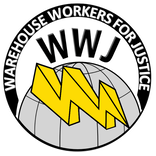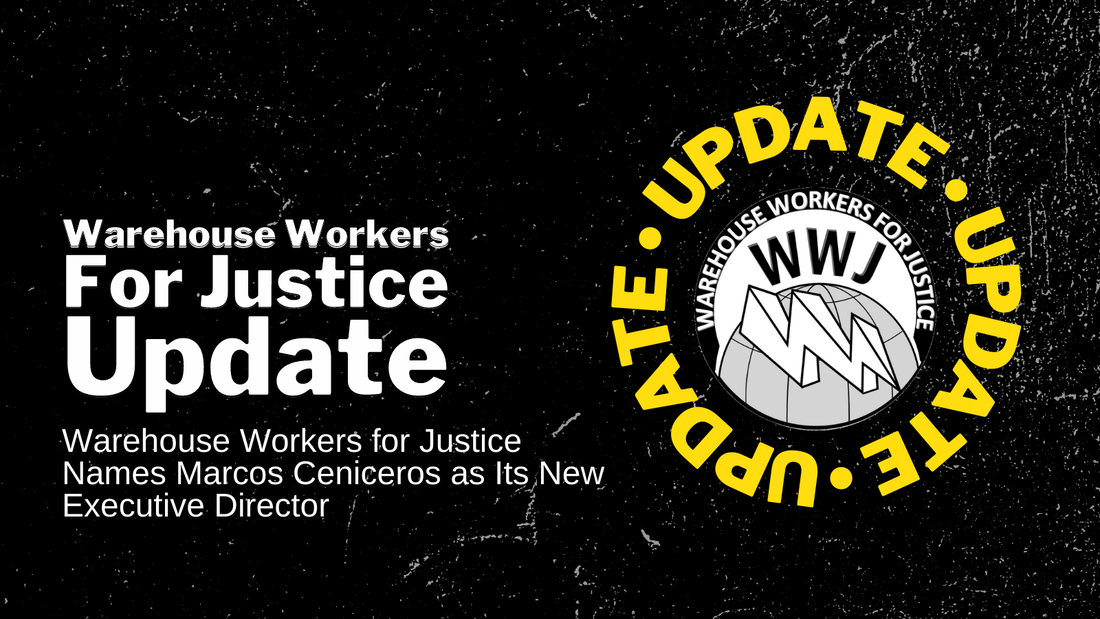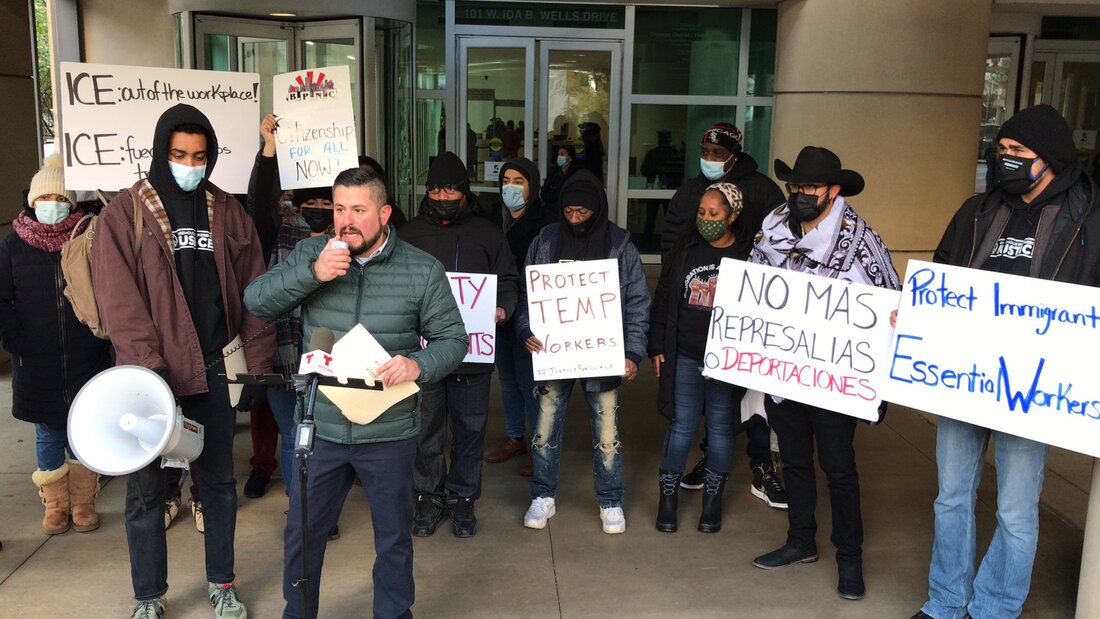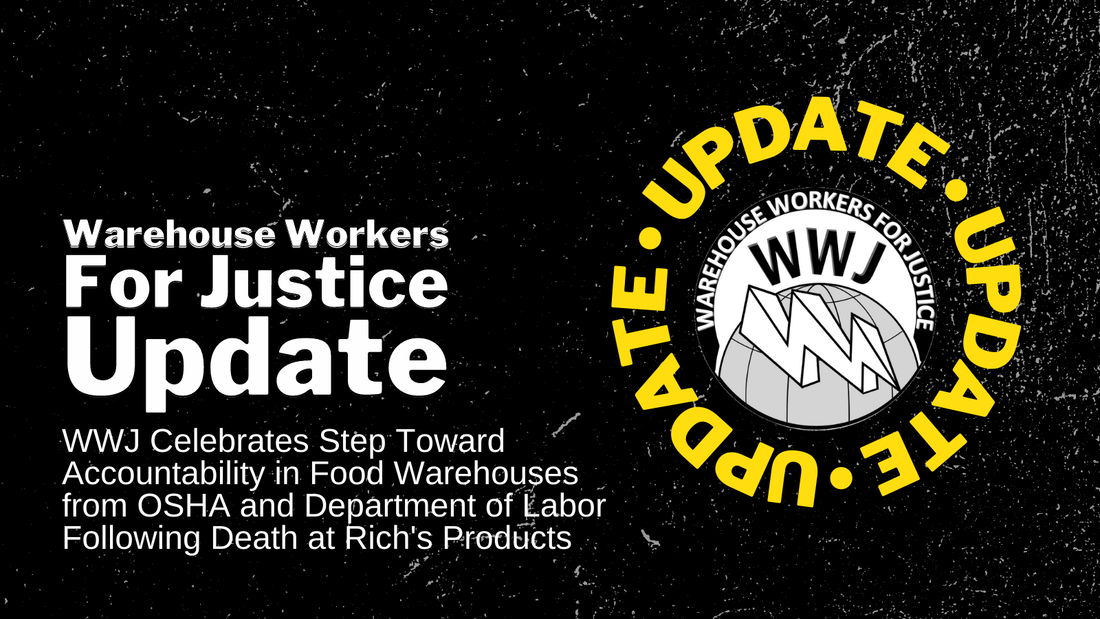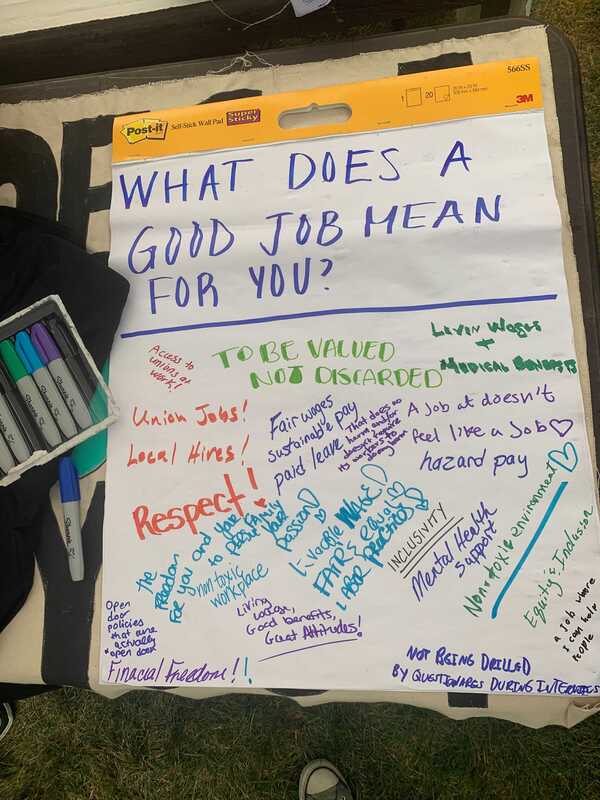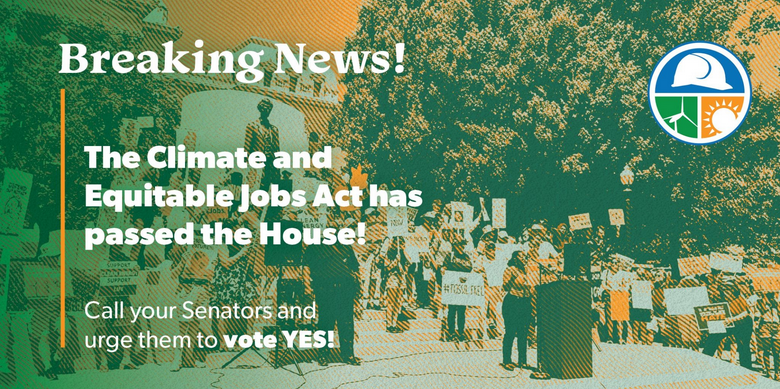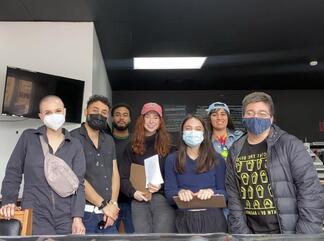 Coalition canvassing team getting ready to knock doors to collect petitions in support of affordable water for all Joliet residents. Coalition canvassing team getting ready to knock doors to collect petitions in support of affordable water for all Joliet residents. Written by: Zhenya Polozova, WWJ Policy Coordinator When the City of Joliet announced it was running out of water and intended to triple the water rate for the average household to pay for a new pipeline to Lake Michigan, Warehouse Workers for Justice sprung into action. More than 20 local organizations and hundreds of community members have come together over the last two years to call on the Joliet Public Utilities Department to adopt a graduated water rate to minimize the cost increase for the region’s working families, as well as other changes to make water service more equitable and accessible. Our organizing won the support of several members of Joliet’s city council, which led to the adoption of a graduated water rate with significant protections for low income residents – including the reclassification of renters from commercial to residential water users. This change in city policy will lower water bills for many working families. Another significant change, thanks to our organizing, is the Joliet Public Utilities Department adopting a standard operating procedure for residents at risk of losing water access. Now, the Utilities Department will explore all possible options to maintain the flow of water. Furthermore, a lifeline rate will be created to ensure that low-income households can afford the water they need to survive, and regressive, burdensome reconnection fees will be eliminated. The work leading up to this victory has been substantial. Our coalition members spent hours on end door-knocking, talking to residents, organizing and participating in community outreach events, reaching out to ally organizations for insight and support, researching policies implemented in other cities, meeting with the Joliet Public Utilities Department to discuss the issues residents are facing, and so much more. We’re proud to say that all the hard work has paid off – we are thrilled to share this victory with you and with the hard working families of Joliet who will reap the benefits. Will County, where Joliet is located, contains operations for approximately half of all Fortune 500 companies due to it being an epicenter for the logistics industry and home to CenterPoint, the largest inland port in North America. One of the key issues of our campaign was the fact that renters were paying the same rates as commercial and industrial water users despite these users consuming disproportionately more water. This billing practice was inequitable as many of the commercial and industrial users – warehouses owned by the wealthiest corporations in the world such as Amazon, Target, Home Depot – generate unimaginable profits in the millions and billions per day and can absolutely afford to pay more. “Amazon, the largest employer in Joliet, made billions of dollars in profit during the pandemic, and yet have been paying the same exact water rates as single family renters in Joliet for years,” said Marcos Ceniceros, Executive Director of Warehouse Workers for Justice. “This is indicative of how our economy is fundamentally unfair and rigged against working people, who are ultimately the ones responsible for the profits of Amazon and all other corporations. We’re glad to see the City of Joliet moving in the right direction and we are committed to continuing to fight for all working people in Joliet and beyond.” “We cannot understate the importance of this legislative win," said Cesar, At-Large Joliet City Council Member. “We have made significant progress in the efforts to create a more equitable water rate system. The success here in Joliet can now become a model to follow in neighboring municipalities. Yet we cannot relent. The fight for clean and affordable water will continue across the nation.” "We are grateful for the leadership of Warehouse Workers for Justice and Councilors Guerrero and Ibarra to ensure Joliet's water rate policies prioritize the needs of working people,” said Ann Baskerville, Conservation Organizer with Sierra Club Illinois. “Joliet's Lake Michigan water allocation is a precious resource that will require decades of stewardship. The City should seek community feedback during the transition to Lake Michigan water to ensure affordability and community engagement during this historic project. We also encourage the City to research and enact water conservation policies, especially for the large industrial users in Joliet who have the most resources to invest in best practices to conserve Lake Michigan water.” 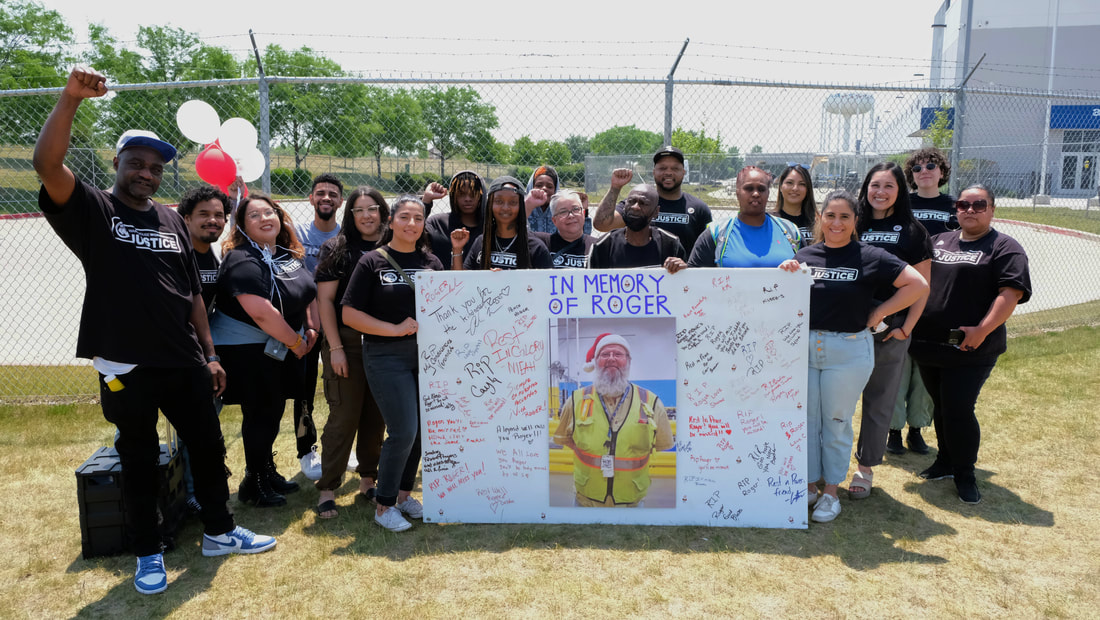 WWJ staff stand outside MDW2 holding an "In Memory of Roger" poster with signatures from his co-workers at the facility. WWJ staff stand outside MDW2 holding an "In Memory of Roger" poster with signatures from his co-workers at the facility. Joliet, June 27, 2023 – Warehouse Workers for Justice (WWJ) has been engaging with MDW2 workers since we received news of the worker fatality on Friday, June 2. On Friday, June 9, workers hosted a gathering during lunch to pay tribute to their departed colleague, Roger Kieca. Despite Amazon’s quick declaration that Roger died of natural causes and that his untimely death had nothing to do with his working conditions, Amazon’s internal healthcare service, “Amcare”, told 911 that dehydration was the cause of Roger’s medical crisis. Given the high temperatures that day, and the fact that, according to city records, another warehouse worker was hospitalized across the street with “dizziness” just hours later, workplace conditions seem very likely to have been a contributing factor in this workplace tragedy. “It is unconscionable that a worker died at MDW2 and, instead of a good faith and transparent review of internal policies that could have led to this tragedy, Amazon is doing whatever it can to sweep the incident under the rug,” said Marcos Ceniceros, Executive Director of Warehouse Workers for Justice. “Workers deserve to feel safe at work and that’s only possible when their employers are clear and honest in addressing workplace tragedies to ensure they never happen again.” After weeks of engaging with workers, WWJ has a number of outstanding questions and concerns:
This is not the first time that emergency response protocols have been called into question at MDW2. When a maintenance technician died at the neighboring facility in 2019, a lawsuit alleged that Amazon failed to render emergency aid, waited to call the paramedics, and delayed them once they arrived at the facility. According to the recent report “The Injury Machine”, despite being injured at nearly twice the rate as the industry average, Amazon workers are over 3x as likely to continue working through the injury. This abusive corporate practice has deadly consequences when workers experience grave medical situations, such as happened at the MDW2 facility on June 2. In light of the deadly risks, we are calling on Amazon to share greater details around how it plans to minimize response time for medical emergencies. In the absence of that transparency, we are asking the relevant authorities to seek greater oversight of industry practices with regard to emergency medical services to ensure that all warehouse workers across Will County are kept safe. Warehouse Workers for Justice will continue monitoring this situation and the broader workplace conditions at area warehouses. Should any workers feel unsafe at work, especially as Summer days make many warehouses dangerously hot, we urge them to reach out to us at (815) 722-5003. COVID-19 OutreachWWJ’s COVID-19 Outreach team has been “out and about” in Will County providing information about our services and COVID-19 essentials, including COVID home testing kits and KN95 masks. In the beginning of April, WWJ partnered with Spanish Community Center, Lighthouse Church of All Nations, and Holsten Human Capital Development (HHCD) for their weekly food pantries. Passing out more than 400 food boxes, WWJ has been able to have over 100 conversations with community members and warehouse workers on Covid-19 vaccine and testing information, housing assistance and workers’ rights. WWJ has also attended a few community events, including one with our partners at United African Organization (UAO) for their Chicago African Summit and Community Resource Fair. Between April and May, WWJ in total has distributed 400 PPE kits and 250 COVID-19 home test kits. We continuously thank our Will County partners and navigators for their work and efforts to stop the spread of COVID-19. For more information on our outreach work or on our services, visit our website at: https://wwjworkeroutreach.org/ Legal OutreachWWJ co-hosted and attended the Vaccination Clinic at St. Peter Lutheran Church, spearheaded by the Will County Health Department. We proudly provided community members with legal resources, as well as PPE kits and at-home covid tests. WWJ also assisted The Salvation Army in distributing food boxes at the drive through food pantry, where over one 100 boxes were distributed. Lastly, WWJ attended the Civil Legal Aid, R3, & Restorative Justice community resource fair, as a community partner, hosted by Prairie State Legal Services where community members were able to learn about the resources offered in Will County, as well as sign up for legal referrals and receive PPE kits. Food Worker JusticeFood Worker Justice Director Tommy Carden was a panelist in the Food Chain Alliance session at the 2022 Labor Notes Conference. Additionally, WWJ organizers Nick Domberg, Felix Ortiz, Brandin McDonald, and Violeta Thompson participated in HEAL’s School of Political Leadership program, a six month long program supporting teams of leaders in the food justice movement. Nick, Brandin, Felix, and Violeta brought their experiences as former warehouse workers and Joliet community members to design a campaign plan to support workers seeking to leverage the Good Food Purchasing Policy in organizing fights against low pay and inadequate working conditions. Environmental JusticeOn June 5th, just days before the Biden Administration and global leaders met in LA for the Summit of the Americas, WWJ’s Environmental Justice staff and leaders joined members of the national Moving Forward Network on kayaks outside the port of LA/Long Beach, the nation's largest container port, to demand clean air for portside communities of color. Warehouse workers, their families, and environmental justice communities at the fenceline of freight pollution from the warehouse industry demand zero emissions NOW, from Joliet to Newark to LA. The land and labor of our communities creates massive profits for the warehouse industry, and warehouse workers deserve to have clean air and good jobs in return. #ZeroMustMeanZero TWUAPAs part of the WWJ/TWUAP partnership with Cook County Department of Public Health (CCDPH), COVID-19 and Worker Rights outreach continues with organizers Bobby and Brandin in the communities of Bedford Park, Park Forest, Melrose Park, Olympia Fields, Markham, Dolton & Harvey for TWUAP. PPE kits and COVID-19 prevention and awareness materials were distributed to workers in those south suburban communities. TWUAP continues to build relationships with allies within the labor movement. Director Jannelle White who serves on the advisory committee for The DePaul University Labor Education Center, attended their annual Fundraiser on June 2nd. She also attended the appointment of the new Executive Director of the Illinois Latino Caucus, Oswaldo Alvarez in May. TWUAP recently accepted an invitation to speak before a panel on “healthy work” virtually with the US Department of Labor. Fundraising/DevelopmentWWJ thanks all our allies and supporters for a successful kickoff campaign and open mic night fundraiser in support of our Record Relief Solidarity Fund. We raised even more than our goal of $5,000 to go towards our sealing and expungement program. If you missed the kickoff campaign, you can still support the Record Relief Solidarity Fund and listen to stories from workers who have successfully cleared their records here. Connection to sealing and expungement services can be life-changing, and we’re excited to help more workers get their records cleared! CommunicationsWWJ’s reach continues to expand. We’re grateful for each follower, like, comment and share. All of your engagement helps to amplify the work our teams are doing to serve Chicagoland working class communities. In an effort to streamline how WWJ disseminates information about our events, actions and ongoing outreach, we’re excited to roll out the newly reformatted quarterly newsletter. We invite you to stay connected with us via our email listserv and various social media accounts. If you have questions feel free to reach out to our Communications Team directly at comms@warehouseworker.org!
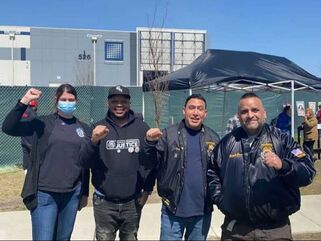 WWJ Workplace Organizer, Bobby Frierson, standing in solidarity with ALU & Teamster organizers WWJ Workplace Organizer, Bobby Frierson, standing in solidarity with ALU & Teamster organizers Despite falling short in union vote at second Staten Island Amazon facility, signs point to growing movement in support of organized labor. May 4, 2022, CHICAGO - The Amazon Labor Union's (ALU) latest organizing drive was on the heels of a historic victory with Amazon workers from JFK8 in Staten Island, New York becoming the first warehouse of the mega retail giant to successfully vote to unionize in the United States despite a continued failure of Amazon to voluntarily recognize the ALU. The continuation and expansion of this worker led organizing drive is sending a clear message that Amazon workers want to be treated fairly. Harnessing this energy, the ALU continues to pick up steam under the leadership of former Amazon worker Chris Smalls as founder and first union president. Warehouse Workers For Justice (WWJ) is proud to have supported this recent unionization drive by dispatching one of our seasoned field organizers to help with the final organizing drive for Amazon LDJ5. “Workers are excited to have a voice and be part of the change needed in the warehouse industry.” said Bobby Frierson, WWJ Workplace Organizer. “My experience working alongside these amazing ALU leaders to organize another Staten Island Amazon facility has been nothing but energizing. Just to have the opportunity to stand with workers and feel that we are winning the fight against these corporate giants is incredible. I am proud to have represented WWJ as we stand in solidarity with the ALU and all Amazon warehouse workers around the world.” The push for Staten Island based Amazon workers to organize culminated with a rally held on Sunday Apr 24, 2022 with support from labor organizers, leaders and some notable elected officials including Senator Bernie Sanders and US Representative Alexandria Ocascio-Cortez. Workers at LDJ5 voted last week facing an overwhelming union-busting campaign run by Amazon. The results were announced on Monday May 2, with a count of 380 votes to be represented by ALU and 618 against according to the NY Times. While the results of the vote weren’t the desired outcome for the novel union and its allies, ALU is not backing down. President Chris Smalls said at a press conference immediately following the vote, “We’re gonna regroup and reassess then get right back in the game”. In fact, Amazon workers are already seizing the opportunity to collectively improve their working conditions as the ALU has released a new list of 8 demands based on feedback from workers including:
WWJ will continue to stand in solidarity with Amazon workers and all warehouse workers nationwide. We are proud to be just one member of a broad network of ALU allies and supporters across the country and we know that together, we will win. If workers are interested in learning more about standing up for their rights in the workplace, they can call our hotline at (815) 408-1231 or find us on the web at ww4j.org. FOR IMMEDIATE RELEASE: Tuesday, February 22, 2022 Contact: Marcos Ceniceros, marcos@warehouseworker.org, 773.386.7495 Warehouse Workers for Justice Names Marcos Ceniceros as Its New Executive Director CHICAGO, IL - The Board of Directors at Warehouse Workers for Justice (WWJ), an Illinois-based warehouse worker center, officially named Marcos Ceniceros as its new Executive Director on January 20, 2022. Marcos was born and raised in the southwest side of Chicago to Mexican immigrants who dedicated their lives to family, faith and work. Throughout the years serving at his local church, being a Chicago Public Schools alum and experiencing the struggles of working immigrant families, like his own, the power structures and inequitable systems became clear to him. This drove him to become more involved in organizing and politics. He most recently held the position of WWJ’s interim Executive Director, after initially serving as its Associate Director. He joined in Spring 2021 and continues to build power for working people throughout the city and state. Marcos is excited to continue expanding WWJ’s organizing and outreach efforts from the past year to build worker power and change the industry in our region and across the country. “Warehouse and logistics workers continue to go through many hardships, many exacerbated by the pandemic, and there is no better time than now to organize workers as they fight for better wages and better working conditions,” Marcos said. Prior to WWJ, he accumulated a wealth of organizing experience at the Brighton Park Neighborhood Council, a community-based organization, as both a youth and community organizer. He worked on campaign issues such as having an Elected School Board in Chicago and raising the minimum wage across the state. Through this work, Marcos grew as an organizer by leading canvasses, organizing community meetings and taking community leaders to Springfield, IL to lobby for these and other important issues that successfully pushed campaigns forward. While at Grassroots Collaborative, a coalition of labor and community organizations, he developed and supported coalitions that took on Chicago’s budget and budget process to ensure fully-funded resources for low-income and working families. Throughout the years, he also led and developed popular education curricula focused on equity, race and power. For the past 8 years, Marcos has been an affiliated organizer and currently sits on the Party Committee for United Working Families, an independent progressive political organization. “For too long, corporations, developers, and billionaires have built their wealth on the backs of working people and decimated Black and Brown communities,” said Marcos. “We believe that stable jobs with dignified wages creates conditions for families to thrive, which is what we want for the working people of Joliet, Chicago and the state of Illinois. I look forward to leading our team and building power alongside workers in the workplace and their communities.” “The staff and board members at WWJ are excited to make this announcement and to move forward in the fight to build worker power in the logistics industry with new insight from the leadership that Marcos brings,” said Mark Meinster, chair of the WWJ Board of Directors. WWJ continues to work with members, staff, allies, and funders in building an organization that will win justice for warehouse workers and their communities. ### Warehouse Workers for Justice is an Illinois-based worker center fighting for stable, living-wage jobs in warehouses and distribution centers. We educate workers about labor rights, teach folks how to enforce their rights, organize in the workplace and community and fight for public and private policies that promote full-time work at decent wages in the warehouse industry.
Following the tragic, preventable workplace death of 42 year-old temporary worker Adewale Ogunyemi, the Occupational Safety and Health Administration (“OSHA”), has fined Rich Products Corporation $145,027 in penalties. Further, OSHA’s Region 5 has also placed the company in OSHA’s Severe Violator Program, recognizing the company’s “extensive history of OSHA violations nationwide.”
Warehouse Workers for Justice is glad to see that Rich Products has been fined and classified as a severe violator of health and safety measures, something workers on the ground have known for far too long. While we celebrate this development as a good step forward, we will continue to support workers at Rich Products and at all other warehouses who want to speak up about working conditions without fear of retaliation and come together to create a better future for themselves and their families. Warehouse Workers for Justice will continue fighting to hold negligent companies like Rich Products accountable and we will continue the fight to ensure that immigrant, temporary workers like Adewale Ogunyemi have real lasting power in their workplaces. On Thursday, Jan. 27, 2022, Cook County and Chicago Bar Foundation announced recipients of $180K in outreach grants to community-based organizations.
"Cook County Board President Toni Preckwinkle and Chicago Bar Foundation Executive Director Bob Glaves announced the recipients of $180k worth of outreach grants to 24 community-based organizations across Cook County. The grants will fund community outreach efforts for Cook County Legal Aid for Housing and Debt (CCLAHD). CCLAHD is a county-wide initiative aimed at helping residents resolve eviction, foreclosure, debt, and tax deed issues through free legal aid, mediation services, case management and connections to resources." "Launched in November 2020, CCLAHD provides free services for tenants and landlords dealing with evictions, property owners who are behind on their mortgage payments or property taxes, and creditors or debtors with issues related to consumer debt. Services are provided free to participants regardless of income and are available in all languages. Participants are welcome to enroll regardless of nationality or documentation status." Warehouse Workers for Justice (WWJ) was named a recipient among other groups, including:
FOR IMMEDIATE RELEASE
Contact: Yana Kalmyka, yana@warehouseworker.org, 347-930-9516 Warehouse Workers, Community Organizations, and Joliet Residents Condemn Joliet City Council For Approving Massive Warehouse Development Despite Strong Opposition JOLIET, IL — Tonight the Joliet City Council approved the annexation of over 2,000 additional acres for the proposed NorthPoint development, an expansion of warehousing in Joliet and Elwood, despite mass opposition from residents. The project is now projected to stretch over close to 4,000 acres, an area six times larger than Midway Airport. The approval comes at a time when the City is already struggling to bear the labor, environmental, and social costs of a colossal logistics and warehousing industry. Despite the rapid COVID-19 surge, Joliet City Council refused to provide a means for virtual participation. In spite of the danger of attending an indoor event, 29 residents gave public comments and multiple emails were sent to council members. Not a single public comment was in support of NorthPoint. “NorthPoint attempts to justify decades of environmental degradation by promising ‘good jobs,’ but workers in the warehousing and logistics industries have heard these promises before, and they know all too well that these promises are a lie,” said Yana Kalmyka, Labor and Environmental Justice Director with Warehouse Workers for Justice, a worker center in Joliet. “As it stands, there are zero legally binding provisions in NorthPoint’s plans to protect warehouse workers who are often temporary employees and are among some of the most oppressed in the workforce.” NorthPoint will have damaging generational impacts on local residents, workers, infrastructure, as well as air and water quality. Experts estimate that the development will result in up to 15,000 additional trucks on Joliet roads and the use of half a million gallons of water per day. “I am against the NorthPoint development because our roads can’t handle tens of thousands of additional trucks on the roads a day,” said Ericka Gonzalez, former warehouse worker and community resident. “We are here to remind the Joliet City Council that the people at this meeting are their constituents, and their job is to serve the community, not corporations. We demand job commitments for benefits, healthcare, living wages, and opportunities to grow.” “NorthPoint promises good jobs, but the only thing I know is guaranteed are more revolving door opportunities, less livable wages, and more pollution,” said Angela Ortiz, former warehouse worker and lifelong Joliet resident. “As a former Amazon worker I can attest to the fact that these aren’t good jobs; these are traps set up for people trying to make a living like you and I.” Warehouse Workers for Justice members and Joliet residents were joined by members of Just Say No to NorthPoint, a community organization fighting to stop the project on the basis that it is an irresponsible development that would turn surrounding communities into an unsafe and unlivable industrial zone. Official Hashtags: #JustSayNoToNorthpoint #NoMoreTemps #GreenNewDeal #TaxTheWarehouses
On October 2nd, residents, workers, and families across Illinois gathered at Joliet Junior College on a rainy Saturday afternoon for Warehouse Workers for Justice’s Charged Up Festival. As rain showers came and went, attendees huddled under tents to talk to tabling organizations, participate in live screen printing, and enjoy the live local bands. Partnered organizations tabled to share their environmental justice work with attendees. Each group spoke about their vision for electrification, which is a national movement to mitigate the environmental degradation and devastating health impacts of diesel pollution in predominantly Black, Brown, and working-class communities nestled next to major industrial hubs. WWJ’s Charged Up event brought together community members and electrification advocates from across Illinois for conversations about how a transition to electric vehicles can bring cleaner air and better jobs to the working communities of color who currently work in and live close to the diesel-polluting warehousing and logistics industries.
The Little Village Environmental Justice Organization (LVEJO), a frontline community-led group in Little Village, the neighborhood with the second worst air quality in Illinois, hosted a table to share their work organizing to hold polluting industries accountable. Will County residents got the opportunity to connect with organizers fighting for environmental justice in another part of the heavily-trafficked I-55 industrial corridor. Milling around the tents, one could hear snippets of the powerful conversation between warehouse and logistics workers, truck drivers, organizers, activists, and residents across Illinois.
The Charged Up Festival was a milestone for WWJ’s Transit Justice campaign for better jobs and cleaner air for workers and residents in and around the nation’s largest inland port. With Lion Electric building the largest electric vehicle (EV) manufacturing plant in North America right here in Joliet and the passage of the Clean Energy Jobs Act (CEJA), Illinois is on a path towards a zero-emissions transportation future. Together, we are fighting to ensure that Black and Brown frontline communities have the decision-making power to locally adopt and implement electrification policies that benefit workers and families. WWJ’s Environmental Justice Leadership Committee (EJLC) is organizing to prioritize Will County’s working communities of color and bring them into the fold for electrification. By asking, “What does a good job mean to you?” WWJ’s environmental justice leaders engaged with their community’s vision for a good jobs and clean air future in Will County.
WWJ’s leaders and constituents demand that any industry that moves into Will County- even one that manufactures electric vehicles- provides fair, safe, and family-sustaining jobs. To make a just transition to electric trucks possible, workers and residents must have the power and the platform to make demands of the corporations that make annual record profits off of Will County’s exploited workforce. The national conversation around electrification provides an opportunity for us to uplift the voices of warehouse workers, truckers, mechanics, and EV manufacturers, who are coming together to improve labor standards across the supply chain while eliminating toxic diesel pollution from our air.
Last night, the Illinois House of Representatives passed the Climate & Equitable Jobs Act (SB2408)— the nation’s most equitable comprehensive clean energy bill which resulted from months of negotiations between community and environmental justice groups, organized labor, consumers, and business groups.
This bill can put Illinois on track to a 100% clean energy future by 2050 with 100% carbon-free power by 2045, and has a strong focus on justice for frontline Black and Brown communities and a just transition for workers in communities where fossil fuels are located. As a workers’ center addressing issues at the intersection of worker exploitation and environmental degradation, we recognize that the important fight for environmental justice (especially for Black and Brown, working-class communities hit hardest by climate catastrophe) does not have to come at the expense of stable, living wage jobs and economic investment in our communities. The Climate and Equitable Jobs Act proves that the labor movement and the environmental justice movement can work together to create a bold, abundant, and sustainable future in Illinois and beyond. Warehouse Workers for Justice applauds the House for propelling Illinois forward as a national leader in the creation of good, green jobs, and strongly urges the Senate to follow suit. Use this tool to email your legislators and urge them to pass SB2408 today! Contact: Yana Kalmyka, Labor and Environmental Justice Director at Warehouse Workers for Justice yana@warehouseworker.org, (347) 930-9516 |
Archives
December 2023
WWJ News from 2016 and before can be read here: |

